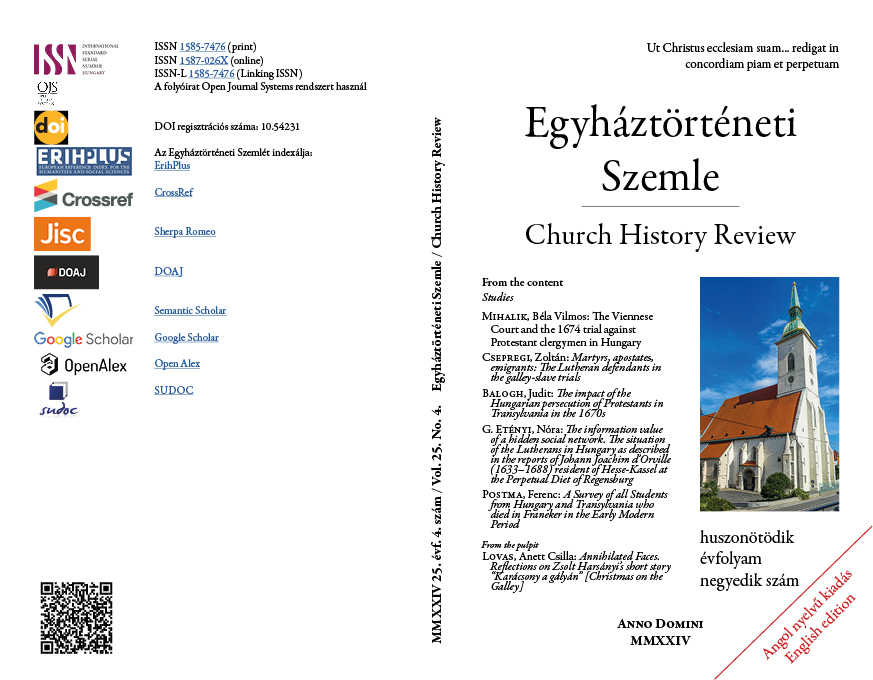The information value of a hidden social network
The situation of the Lutherans in Hungary as described in the reports of Johann Joachim d'Orville (1633–1688) resident of Hesse-Kassel at the Perpetual Diet of Regensburg
DOI:
https://doi.org/10.54231/ETSZEMLE.25.2024.4.4Keywords:
Johann Joachim D'Orville, printed weekly newspapers, manuscript news flow, imperial assembly, evangelical sense of belongingAbstract
Between 1671 and 1681, during the period of Lipót I's open absolutist rule, the multifaceted crisis of the Protestant communities in Hungary was intensely publicised in the international public sphere of the time, especially in the printed political discourse of the German-Roman Empire. The envoy reports of Johann Joachim D'Orville (1633-1688), the diplomat who represented the Principality of Hesse-Kassel at the Imperial Assembly in Regensburg, prove that the issue of Protestants in Hungary was a prominent and multifaceted part of the political discourse of the German-Roman Empire not only during the open sectarian conflict of the 1670s, but also during the great ordeal of the war against the Ottoman Empire in the 1680s. The resident of Hesse-Kassel in Regensburg had a wealth of information on the political significance of the 1681 Diet of Sopron, the role of the Palatine Elector Pál Esterházy, the negotiations with Imre Thököly, and the actions of Lipót Kollonits (1631-1707), later Cardinal and Archbishop of Vienna, then Bishop of Vienna, against Protestants. The Hessian envoy also observed Kollonich's role in his presidency of the chamber, which brought about a major change in the daily life of the free royal towns.
D'Orville s secretary, Niklas Wilhelm Göddäus (1646-1719), continued to report regularly on the situation of evangelicals in Hungary and the possibilities of practising the faith after the Diet of 1681, mainly on the basis of information from evangelicals in Sopron. Justus Eberhard von Passer (1652-1733), the later envoy of Hesse-Darmstadt to Vienna in 1692 and 1704, who, in addition to his multifaceted knowledge of life in the imperial city, also had a substantial knowledge of political conditions in Hungary, may have helped to gather information. D'Orville had received reliable information from Johann Jonas Schrimpf, Hesse-Kassel's agent in Vienna, who had been an agent and then resident in Vienna between 1649 and 1696.
The reports of the prepared resident of Hessen-Kassel in Regensburg prove that, although the manifest printed news of the Turkish war and the liquidation of the Thököly rebellion partly 'obscured' the politically more sensitive sectarian issues in the 1680s, the less public background discussions and manuscript diplomatic reports at the imperial assembly clearly reflected the changes in the internal political power relations in the Kingdom of Hungary and the dwindling possibilities for the urban Lutheran communities.
Downloads
Downloads
Published
Conference Proceedings Volume
Section
Categories
License
Copyright (c) 2025 G. Etényi Nóra (Szerző); Bakonyi-Tánczos Vera (Fordító)

This work is licensed under a Creative Commons Attribution 4.0 International License.
The author(s) reserve the copyright of their work.
The Church History Review does not restrict the rights of authors to place their manuscripts or manuscript versions on preprint servers or other hosting. This applies generally to the following formats.
- Submitted version
- Accepted version (manuscript accepted by the author)
- Published version (Version of Record)









